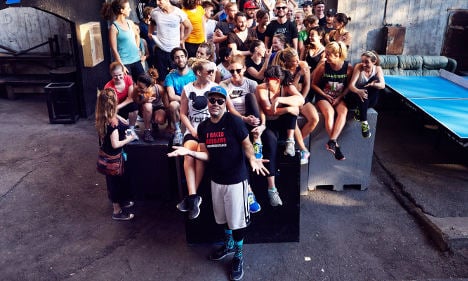A year ago this month, Kristian Hell posted a Facebook status update stating: “I’m going for a run on Tuesday”. Seven of his friends showed up.
Within weeks he was regularly gathering a gang in double figures. This summer, what has evolved into Ssideline City – a running and lifestyle club – is expecting up to 300 people to turn up to its regular Tuesday night events.
“There is a running club and health boom here in Stockholm, but what we offer that's different is more of a network for people who are also creative and interesting,” says Hell.
“Winning is participation, No one gets left behind, everyone finishes,” adds the Australian, who moved to Stockholm six years ago in search of a “fresh start”.
“It’s not just the nerds who go running. Our approach is less structured than you might experience at other clubs. It's about having fun, which is why we also organise parties and other events too. Half of our members are international and I'd say international people are especially open to the social aspect of what we do.”

Hell with some Ssideline City runners. Photo: Robert Nilsson
The initiative is just one of a cluster of projects that Hell is involved with, having immersed himself in the capital's fashion and music scene after deciding to settle in Stockholm in 2009.
“I left Australia on a one-way ticket looking for a new adventure,” says the entrepreneur, who is originally from Mooloolaba on the Sunshine coast.
“At first I had my eye on Reykjavik in Iceland, but I fell in love with the vibe here [in Sweden]. I like the nature of the people. They are honest and sincere. If you talk about an idea, that idea usually happens. Back home there is a lot more talking that doesn't develop into anything.”
While straight-talking Swedes may have supported his ideas, Hell's enthusiasm and outgoing nature have clearly been key assets along the way.
“I am good at meeting people and networking,” he says. “I've got to know a lot of people here in Stockholm and there are a lot of eyes on what I am doing right now.”
Hell's other main work has included launching Poster Press, an arts scene magazine and working the door at Trädgården, a huge outdoor club on Stockholm's hipster island Södermalm, where you can eat, drink, dance or play ping pong or boules until the early hours.

Kristian Hell at Trädgården. Photo: Izabella England
After midsummer, Trädgården and Ssideline City are set to formally cross paths for the first time, with Tuesday night runs starting and finishing at the club, followed by gigs and live music.
Before that, Hell's running club is linking up with another live music venue on the island, Laika at Hornstull, with runs of between five and ten kilometres starting from the bar at the end of April, to coincide with the brand's official relaunch. The company has recently also started offering Monday night classes including yoga, nutrition and self-defence, and longer runs on Saturday mornings, followed by a group brunch.
READ ALSO: 'There were no good brunch spots in Sweden'
“People choose to run for many reasons, but running to me is about activating the mind, connecting and the death of stress,” says the entrepreneur.
All of Ssideline city's events are currently free, with Hell hoping to make money from “some of the big companies watching” him and from forging further connections within the arts, business and fitness communities along the way.
His long term goal is to launch Ssideline City across northern Europe and says he even has a “cool meeting” about his business coming up in New York.
“What I am doing is constantly evolving. The brand actually started out as Ssideline when I was selling jeans back in Australia. That didn't work out, but I wanted to keep hold of the name as my projects moved forward,” says Hell.
Brimming with confidence and optimism, the entrepreneur has very few negative words about his adopted nation.
“It's a cliche for expats to moan about the cold but I see the winter as a positive thing. It provides an opportunity to work really hard and get a project finished. I like to reframe things and turn a negative into a positive.”
As Trädgården prepares to open its doors next month and Ssideline City steps up a gear for summer, Stockholmers can certainly be excited about experiencing the fruits of his labour.



 Please whitelist us to continue reading.
Please whitelist us to continue reading.